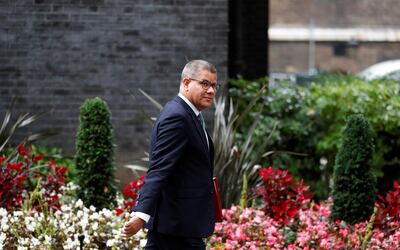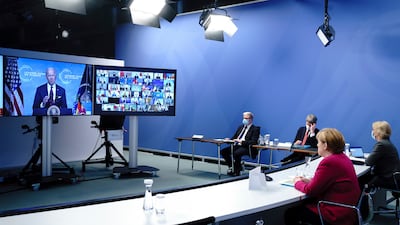Climate negotiations in the run-up to Cop26 are being slowed down by “Zoom diplomacy”, an adviser to the summit has said.
Nick Mabey said moving to face-to-face discussions was essential for building trust before the UN climate summit opens in November.
He said the weeks before the Glasgow summit would be crucial as ministers try to reach agreement on phasing out coal.
Travel constraints linked to the pandemic have hung over preparations for the summit, which the UK has insisted must take place in person.
Britain describes Cop26 as the “last best chance” to avert climate catastrophe brought about by global warming.
“There’s not a lot of time, but it is possible,” said Mr Mabey, head of climate think tank E3G and an official Friend of Cop26 who advises the UK government.
“The critical issues we need to see now is much more political leadership … and really moving from Zoom diplomacy to face-to-face talks,” he said.
“Zoom diplomacy has really slowed down the process of building trust and agreement between countries. That’s really important.
“It’s not just about what happens in those two weeks [of the summit]. It’s about what we build up to it, and prepare to land at … at Cop itself. We need to be using this to bend the curve of the whole global economy.”
Cop26 president Alok Sharma last month defended his frequent air travel after critics accused him of setting a poor example.
Mr Sharma described his in-person meetings with ministers from other countries as “incredibly vital and actually impactful”.

Delegates who cannot be vaccinated at home have been offered shots by the UK government so they can travel to Glasgow for the summit.
British taxpayers will also cover the cost of hotel quarantine for officials arriving from countries in the UK's red list.
Mr Mabey said a show of solidarity with developing countries and those hit hard by Covid-19 was necessary for the talks to succeed.
Wealthy countries are under pressure to meet a target of $100 billion (£72bn) in climate aid for developing nations that was first promised in 2009.
“We need to see the rich countries delivering on the [$100bn] or we’re never going to discuss more ambition,” Mr Mabey said.
“Also, just access to and inclusivity of Cop26 during a pandemic – who can get to the table, will the smaller countries and red-list countries be able to get to Cop and negotiate their interests?”
The summit will be preceded by a G20 leaders’ summit at which Britain will resume efforts to agree on an end to coal.
Mr Sharma expressed frustration after talks between environment ministers in July ended without agreement on phasing it out.
Another milestone will be China’s updated climate blueprint, Mr Mabey said. Beijing missed an end-of-July deadline to submit its latest plans to the UN.
“The next thing you should be looking for is China’s announcement on its targets going forward. We hope to see that in the next couple of weeks,” he said.
Mr Sharma said last week that China had encouraging plans on climate change but that it remained to be seen how quickly they would be implemented.
He said the energy policies of China, the world’s biggest consumer of coal, would “shape our shared future”.


